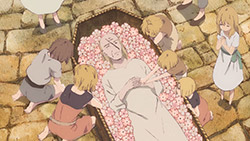 |
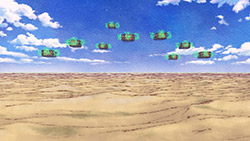 |
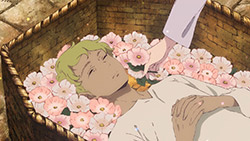 |
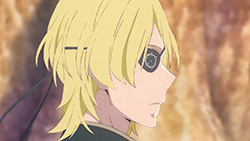 |
 |
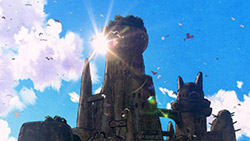 |
 |
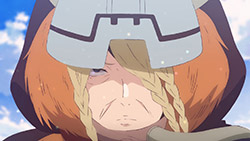 |
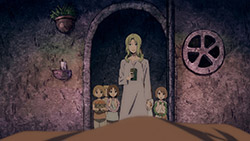 |
 |
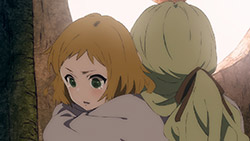 |
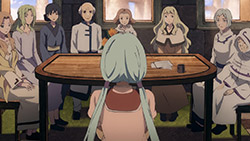 |
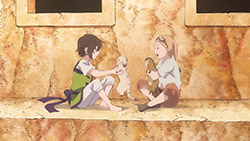 |
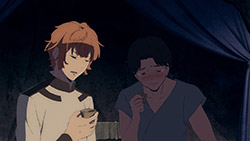 |
 |
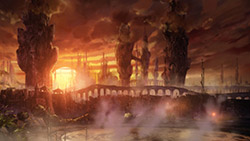 |
 |
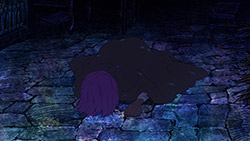 |
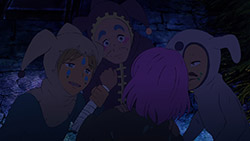 |
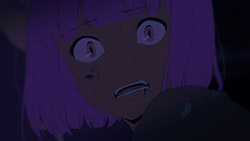 |
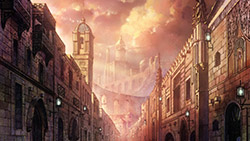 |
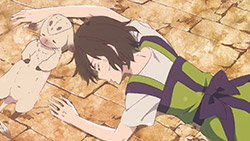 |
 |
 |
 |
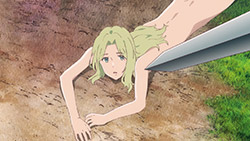 |
 |
 |
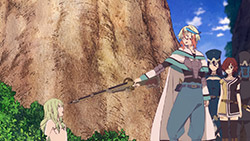 |
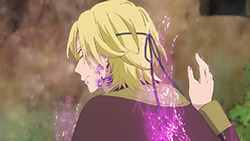 |
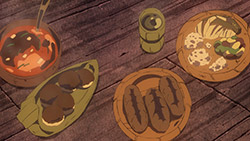 |
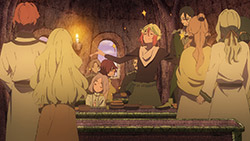 |
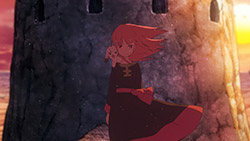 |
 |
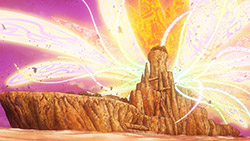 |
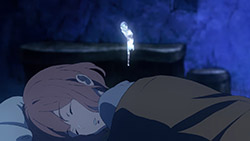 |
「新しい旅に出るわ」 (Atarashii tabi ni deruwa)
“I’m Setting Off On A New Journey”
Pathway to the Afterlife
With the tide of battle ebbing away, the remains of a costly battle become rather evident. And it really touches me how so much compassion and deliberation goes into remembering the dead. Even while grieving for their friends, the Falainians gave time to commemorate lives lost by the very enemy that swore to destroy them. As they went about sending off caskets, I wondered if their prayers to guide lost souls would extend to comrades who fell on Skylos, forever sunken beneath the treacherous waves of sand.
Encounter with the Unknown
Following the conflict, I like how they set up a meeting between the Mud Whale and another civilisation. In my opinion, this interaction was long overdue, and brought a new perspective to the table. Although the Nous appeared to have been widespread throughout the world, countries exist that choose to rely on advancements in technology, as opposed to making sacrifices for the supernatural gifts that Thymia might bring. If anything, it seems that Thymia allows for a gap to be bridged, where a significant difference in strength would otherwise have existed – as seen when the foreign delegate was easily prevented from attempting to annex the Mud Whale. After Suou opted for a pacifist approach, the situation looks to have stabilised, and a distinct possibility even arises where alliances are concerned. But with ulterior motives remaining unexplored, pertaining to foreign expansionist policies, it’s hard to determine whether such an agreement would be sincere.
Concluding Thoughts
So it seems like Falaina was lacking an essential component required on any sea-worthy ship: a rudder. And as of now, there doesn’t seem to be any particular drawback either in regards to its functionality. My suspicions of the Kokalo being a sinister object were misplaced, and my doubts especially crumbled when it took on the form of an adorable creature, though it’s always possible that adverse effects may start showing up much later. Having finally received a means of navigating itself, we can perhaps expect a new turn in the Mud Whale’s mysterious journey through the world, which might not be as aimless as it initially seemed. Will the Kokalo be a catalyst for salvation, or the beginning of a descent into further damnation? With so few episodes remaining, it’s difficult to say whether such a question will ever be answered.
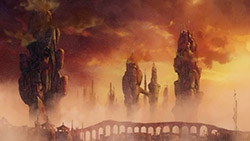 |
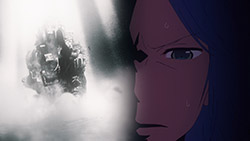 |
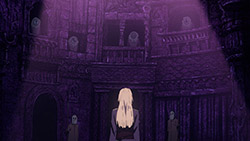 |
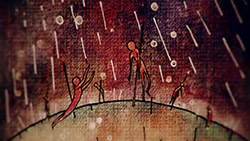 |
 |
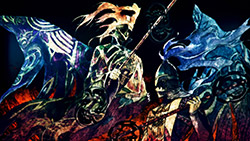 |
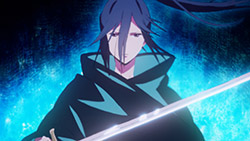 |
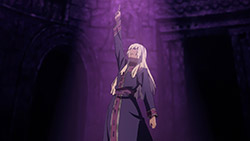 |
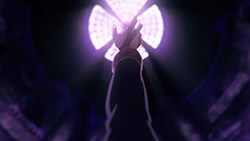 |
 |
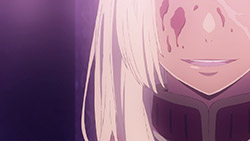 |
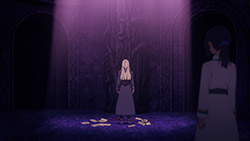 |
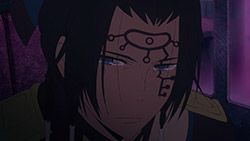 |
 |
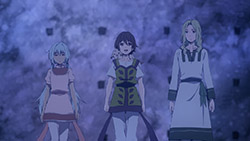 |
 |
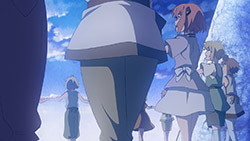 |
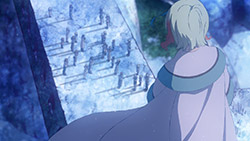 |
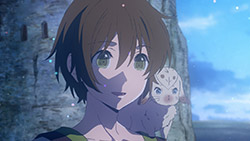 |
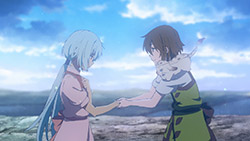 |
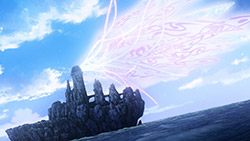 |
 |
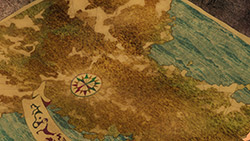 |
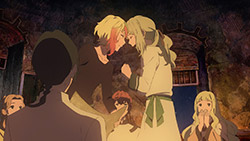 |
 |
 |
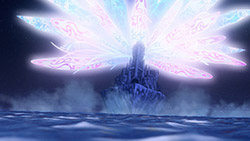 |
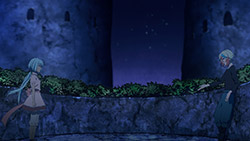 |
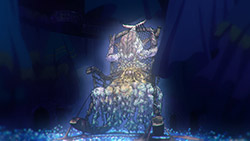 |
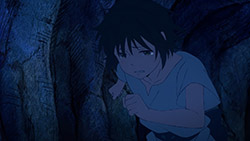 |
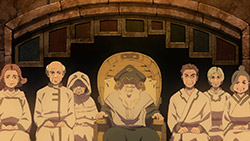 |
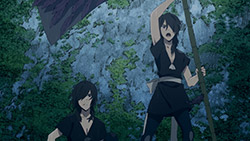 |
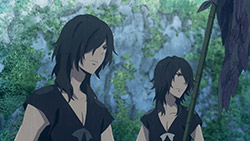 |
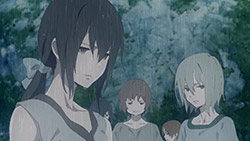 |
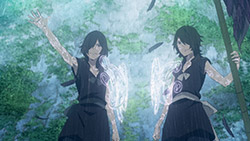 |
 |
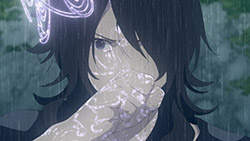 |
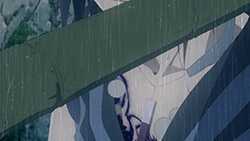 |
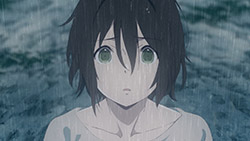 |
「夢の話だ」 (Yume no Hanashi da)
“It’s Just A Dream”
The Trial
Franz Kafka might have been proud of the way in which the trial turned out. For starters, it was utterly absurd, to the point where it accurately rendered a stark depiction of the Empire’s dystopian society. Though its frivolous procession lacked self-awareness regarding its own nature, a necessary criteria for achieving the post-modernist form, it was bloody entertaining if not somewhat contradictory. Isn’t it ironic to watch seemingly emotionless people becoming swayed by Orka’s theatrical rhetoric? Of particular note was how he manipulated Araphne into shooting at him within the court room, before telling a cautionary tale of ‘daemons‘ to strike fear within the judiciary panel deciding his fate. By correctly playing all the cards, he saves his own life, as well as most of his own subordinates, while essentially keeping the title of Commander-in-Chief. To that end, I can only say that his feats demonstrate a remarkable competence rarely seen. With only one episode left and another issue taking up the forefront, I get the impression that this will be last time that we see the Empire in this series. A shame too, because Orka possesses the makings of an impressive villain, something that Kujira has sorely lacked for the duration of its run.
Origins of the Nous
I want to highlight the Greek etymology surrounding ‘The Rain of Katharterio‘, which literally translates to ‘Purgatorial Rain‘. Speaking in literary terms, the Purgatorio from Dante’s Divine Comedy was a mountain, representing seven levels tied with the deadly sins, in addition to Paradise, which sat at the peak. Dante characterised suffering and spiritual growth through overcoming these obstacles in order to reach the top, seeking to discuss the nature of sin, as well as outlining moral issues inherent to politics and religion. These immediately become relevant, where a beautiful attribution of purgatory becomes corrupted in light of the Empire’s actions. Though Dante’s poem outlined a theory that all sins arise from love, the Empire takes it to the other extreme, by using the Nous to construct an allegedly sinless world entirely devoid of emotions. In an obsession driven by a want for emptiness, they go about slaughtering as they please, wielding a divine right as a justification for their wrongdoings. This surely can’t be what the Nous wants either, considering what Olivines conveyed to Lykos through a vision.
To that end, I feel like Falaina strikes a central ground – encouraging the constraint of excessive emotions, as opposed to enforcing a whole-scale deprivation. Despite the Marked suffering a comparatively shorter lifespan, Falaina’s simple way of life can unpack a myriad of deeper meaning, one that even visitors are impressed by. We see it in the unique culture they have established over the course of a century, where their special customs and wonderful traditions indicate a greater purpose to their existence beyond mere exile.
Concluding Thoughts
There is much to suggest that the removal of emotions is an unrefined process, and I have an analogy in mind that could cover up some potential plot holes. Just like how zombies might exhibit traits of being alive, moving about searching for humans, they are most certainly ‘dead’. That is how I’ve come to view the Apathoia, as people who retain a bare semblance of emotions, that are for the most part inhibited. The extent of absent emotions probably has something to do with the frequency of visits made to a Nous, as Lykos has slowly gained the capacity to express her feelings, due to time spent away the Nous’ influence. This would help justify why citizens of the Empire are not entirely emotionless, and I feel like perhaps the term has been taken too literally by a good number of viewers, myself included.
We also learn that Failaina has alternate methods of generating power, but I won’t go into too much detail about how it consumes lifespans, because that actually should have been quite obvious. However, the social revolution this revelation may have instigated is a topic that’s definitely worth delving into. Though I’m quite peeved that they chose to introduce the concept so late into the series, and these hammy twins weren’t exactly subtle or eloquent, the prospects of an internal crisis mark an intriguing dilemma that has yet to be seen in Falaina’s 93 year history. There is a youthful naïvety, that remains woefully ignorant of the sacrifice and bloodshed required to bring about a tumultuous insurrection. But conversely, revolutions are also some of the most interesting segments of history, especially in a more contemporary era. It will present the greatest challenge Chakura has ever faced, because a civil war is afoot, which would likely end in a genocide of the Marked. No doubt he feels betrayed by the upper echelons of the Unmarked, who kept such a heavy secret from everybody else. That said, I expect Chakuro to rise above the trepidation of his doubts, in order to choose what is right.
Preview
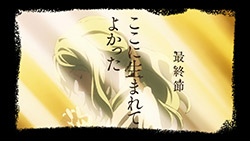 |
 |
 |

It feels like there are far too many things being introduced so late into the series. If this had been two cours then it would make sense for the storylines to be expanding at this point, but surely it’s too late now to make a decent resolution. Which makes me wonder if a second series had been planned from the start.
Oh, and bats that large can’t hover (unless they are special magic mud whale bats, of course). And only birds that migrate alone have their migratory routes “pre-programmed”, birds that migrate in flocks or family groups have to learn the routes from older birds on their first migration.
With Netflix money streaming in, I wouldn’t be too surprised if Kujira has enough funding for a second season. It has teased such a beautiful world, that deserves some proper exploration, even if it comes up short in other areas. I’ll go into more detail next week, as I have stuff saved up for discussion in my finale post.
And yes, those bats clearly gave their lifespan to the Nous, in exchange for some Thymia which helps them hover. Obviously 😛
If Netflix aren’t funding production I don’t see how them acquiring the streaming rights really plays into it coming back for another season. Plenty of shows are licensed for home video/streaming that never see a second season.
Not to mention most big studios likely have a full schedule ahead of the coming year of shows to do so if this one isn’t super successful you probably won’t hear anything.